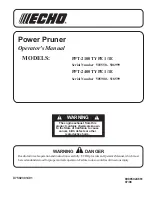
27
RAIL SAW SR-10-26-O & SR-10-26-1
ORIGINAL OPERATION MANUAL
7
Maintenance
Proper, on schedule maintenance increases the service life of the machine, ensures availability and helps prevent unwanted
standstill. The components of the machine are subject to different maintenance intervals depending on the use. The maintenance
intervals must be determined by the system operator as part of the hazard evaluation and risk assessment. Observe the guidelines
in the applicable directives.
Service and maintenance measures are permitted only by qualified specialist companies.
Maintenance must be documented by the operator. It should be clear who carried out the work, when and where (proof of
maintenance).
Only original spare parts as well as suitable tools may be used:
-
The recommended maintenance intervals and inspection intervals are to be followed!
-
The causes of possible defects to look for are, eg. damage, disturbing sounds, overheating, etc.
The machine must always be depressurized before maintenance work.
Daily
1.
Wipe all tool surfaces, fittings, and couplings free of grease, dirt, and foreign materials.
WARNING
Do not attempt to locate hydraulic leaks by feeling around hoses and fittings with hands. “pin –holes” leaks
can penetrate the skin.
2.
Inspect the tool, hydraulic system, hoses, and fittings for signs of leaks, cracks, wear, and/or damage. Replace if necessary.
3.
To prevent contamination, always install dust caps over the hydraulic ports when disconnected.
Monthly
Perform a detailed inspection of the systems hoses, and fittings according to the hydraulic hose operator’s manual and as stated in
SAE standard j1273, May 1989 or latest revision. Replace the hoses and/or fittings if necessary.
7.1
Change of hydraulic fluid
The hydraulic fluid must be replaced annually. Depending on usage and contamination, the hydraulic fluid may need to be replaced
at shorter intervals. Old hydraulic fluid must be disposed of properly. Refilling must be carried out via the hydraulic unit. The
hydraulic unit is not contained in the scope of service of the machine. Old hydraulic fluid must be disposed of properly.



































